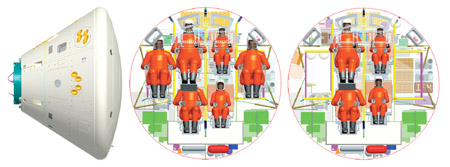This article is more than 1 year old
Space shuttle replacement delayed until 2014
This is why a former astronaut should run for president
NASA has put back the planned launch of its Orion spacecraft for a year, meaning the first test launch won't be until 2014 at the earliest.
The agency's publicly-announced deadline set by Congress to conduct a first test launch of a manned Orion capsule was 2015. Internally, though, it was hoped to fast-track this to 2013 despite technical and financial issues. NASA had hoped to keep the time between the last shuttle flight and the first Orion flight to a minimum.
"September 2014 is when we are saying we will launch the first crew on the Orion," programme manager Jeff Hanley said.
NASA hopes to complete construction of the International Space Station (ISS) and retire the space shuttle fleet in 2010, enabling its budget to be spent on developing and maintaining the Orion program.
Cost concerns are once again at the root of the delay, but NASA is also giving itself room to manoeuvre around any unforeseen technical problems that will inevitably crop up, Hanley told reporters.
"It's the unknowns that we have to hedge against," he told the press. "Having some number of months of schedule flexibility to meet our commitment, in addition to having some number of months of cost flexibility, is key to keeping ourselves in a healthy posture."
The Orion spacecraft will replace the ageing shuttle fleet, and is designed to ferry astronauts to and from the ISS and eventually to and from the moon. But unlike the shuttle, which lands like a traditional winged aircraft, Orion is much more like a capsule that will deploy parachutes and land at Edwards Air Force Base in California.
"As we looked at the plan we had for September 2013 against the available dollars, it became clear to us that we needed to adjust our schedules," said Hanley.
This latest knock for NASA comes as the Aerospace Safety Advisory Panel cited that the space agency was not properly emphasising safety in its design of the new spaceship; its return-to-the-moon programme faces money, morale and leadership problems.
According to the Orlando Sentinel, the 143-page annual report specifically criticised the agency's design of the Orion crew capsule for not putting safety features first.
Because of weight problems with the Orion design NASA had used a different approach, one "without all safeguards included" from the beginning.
The safety advisory panel, which includes two former space-shuttle astronauts was created after the Apollo 1 fire in 1967, which killed three astronauts including Gus Grissom.
Hanley said he had not seen the safety panel's report, which apparently also praised some aspects of the programme and looked at the agency in general. ®

